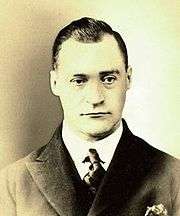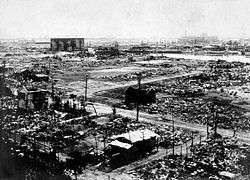Karl Joseph Wilhelm Juchheim

Karl Joseph Wilhelm Juchheim (December 25, 1886 – August 14, 1945) was a German confectioner who first introduced Japan to baumkuchen, a traditional German layered cake.[1] The Juchheim Company, founded by Karl Juchheim and his wife in 1921, continues to sell baumkuchen and other sweets according to Juchheim's original recipe in pastry shops throughout Japan.
Life
Early life in Jiaozhou

Karl Juchheim was born and raised in Kaub, Germany. In 1908, the 22-year-old Juchheim moved to Jiaozhou Bay located in the Shandong Province of China. Jiaozhou, known to the Germans as Kiautschou, was at the time a German protectorate but still under Chinese rule under a treaty agreement made in 1898. Juchheim began working at a café in Jiaozhou. In 1909 he began his own pastry shop where he sold cakes. After a five-year stay in China he returned to Germany for a short time in order to find a wife. Through his uncle, he met a 22-year-old woman named Elise in the spring of 1914 and became engaged to her shortly after. Although only recently returned from China, Juccheim and Elise returned to Jiazhou shortly after their engagement. They married on July 28, 1914, and together started another pastry shop in the city of Tsingtao in the Jiaozhou Bay.
Prisoner of war
Shortly after World War I broke out, British and Japanese forces began the siege of Tsingtao. Karl and Elise were both sent to internment camps in Okinawa, Japan as prisoners of war.[2] While interned, Elise gave birth to their first child on November 4, 1915.
Karl Juchheim and other prisoners were later relocated to Hiroshima in 1917. It was in a German exhibition hall that Juchheim began baking and selling baumkuchen in Japan.[2]
With the end of World War I in 1918, most of the prisoners were released between December 1919 – January 1920. The majority went back to Germany but some, such as Karl Juchheim and his wife, settled down in Japan and East Asia instead.

Post-War period
After the war, the Juchheims opened their own pastry shop in 1921 in Yokohama with the name E. Juchheim, named after Elise. As a pastry chef Karl Juchheim was responsible for the production of the cake and pastries while Elise took care of sales. The Great Kantō earthquake of September 1, 1923, destroyed their shop completely. The couple then moved to Kobe, borrowed a large sum of money and opened a new store.[2] The store was a success and saw growth soon after it opened.
Death
Due to the Pacific War, by 1944 the lease to their shop was terminated because production was no longer possible. The family then moved into the hotel Rokkōsan. There, Karl Juchheim died on August 14, 1945, a day before the surrender of Japan. For cost reasons, his body was cremated. His son, Karl-Franz was conscripted into the German army in 1942 and declared dead following the end of the war. Subsequently his place and date of death were determined to be 6 May 1945, in Vienna.
After the war, Elise was expropriated and deported back to Germany by the Supreme Commander for the Allied Powers. Elise Juchheim was able return to Japan in 1953. Both Karl and Elise Juchheim are now buried in the cemetery in Ashiya.
Company
Today, the headquarters for Juchheim Co., Ltd. is in Kobe, Japan. Its characteristic design has been a tradition for about 40 years. The company boasts that it still produces confectionery according to the original German recipe. Juchheim in Japan has many branches and subsidiaries. Their shops are especially known for their baumkuchen cakes, Frankfurter Kranz, cookies, and apple pie. The group has about 564 employees and annual sales of ¥27.4 billion.
External links
References
- ↑ Kahle, Lynn, and Chʻung-hyŏn Kim. Creating images and the psychology of marketing communication. Lawrence Erlbaum, 2006.
- 1 2 3 "Origins of baumkuchen, cheap onsen trips and this week's CM: Final Fantasy XIII". Japan Times 10 Jan 2010: n. pag. Web. 28 Aug 2010.
|